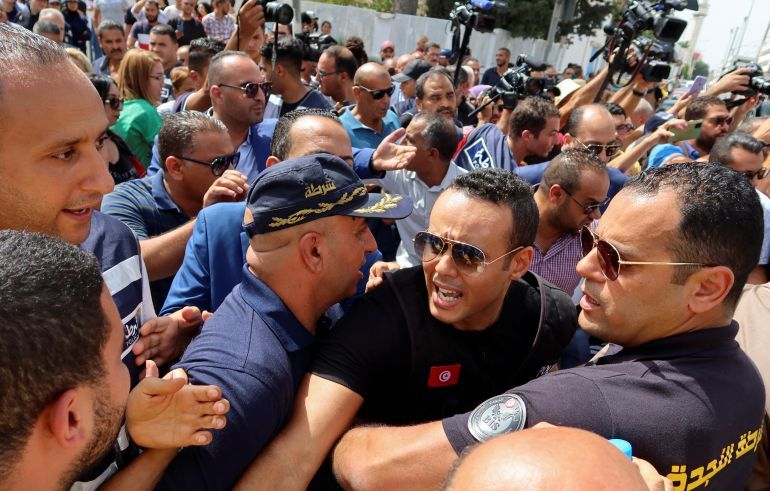
Tunisia judge orders arrest of former prime minister
An “anti-terrorism” judge in Tunisia has ordered the arrest of former Prime Minister Ali Larayedh, vice president of the main opposition Ennahdha party, days after the country held a legislative election marked by a very low turnout.
The judge’s decision, announced on Monday, is linked to a case in which other Ennahdha officials are accused of sending Tunisians to fight alongside armed groups in Syria, according to Ines Harrath, a lawyer who has worked with a group of lawyers defending Larayedh.
Ennahdha, which had the largest number of lawmakers in the previous parliament, denounced the move as a political attack and called for Larayedh, who served as prime minister from 2013 to 2014, to be freed.
The party said its vice president was “deliberately targeted” in a “vain and flagrant attempt” by authorities and President Kais Saied to cover the “failure” of Saturday’s vote, which was the election’s first round of balloting.
 Police members push back supporters of Ennahdha protesting in support of the party leaders in September 2022
Police members push back supporters of Ennahdha protesting in support of the party leaders in September 2022Only 11.22 percent of Tunisian voters cast ballots, according to Farouk Bouaskar, president of Tunisia’s Election Authority. That is about one million voters out of more than nine million registered.
Bouaskar said 21 candidates were elected in the first round, while 133 candidates have qualified for the second round of voting scheduled for January 19. Definitive results will be announced on March 3, he said.
Opposition parties, including the Salvation Front coalition that Ennahdha belongs to, boycotted the election, saying it was part of Saied’s efforts to consolidate power. The decision not to participate in the vote likely will lead to a new legislature that is subservient to the president, whom critics accuse of authoritarian drift.
‘Silence is a crime’
In his first public comments on the election, Saied rejected criticism over the low turnout and accused opponents of trying to cast doubts on whether the new parliament would be representative of voters’ views.
He said the turnout “is not measured through the first round, but through both rounds” of voting, according to a statement Monday from the presidency.
Parliament last met in July 2021. Since then, Saied, who was elected in 2019, has curbed the independence of the judiciary and weakened parliament’s powers.
Meanwhile, Tunisia’s powerful national trade union on Tuesday ratcheted up its criticism of Saied, urging the country’s civil society to not remain silent.
UGTT leader Noureddine Taboubi said the huge boycott of the election shows the frustration and despair of Tunisians.
“It is time for civil society and national organisations, to play their national role … today the silence is a crime … We will not let you mess with the country and we will not be afraid of prisons,” Taboubi said.
Tunisians are also reeling from a financial crisis amid surging inflation, rising unemployment and a shortage of basic food products.
“Today the time is running, and if you do not understand the message, the people will say their word through peaceful struggle,” Taboubi said.
In a July referendum, Tunisians approved a constitution that hands broad executive powers to the president.
Saied, who spearheaded the project and wrote the text himself, made full use of the mandate in September, changing the electoral law to diminish the role of political parties.
Critics have said the electoral law reforms have hit women particularly hard. Only 127 women were among the 1,055 candidates running in Saturday’s election.











